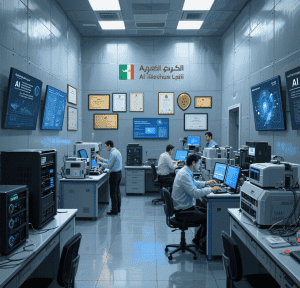Table of Contents
ToggleSaudi Arabia and UAE Vie for Middle East AI Supremacy: A Battle of Intelligent Automation and Strategic Ambition

Saudi Arabia and the United Arab Emirates (UAE) are locked in a high-stakes race to dominate the Middle East’s intelligent automation landscape, pouring billions into AI infrastructure, strategic partnerships, and industrial automation ecosystems. As oil-reliant economies pivot toward digital futures, both nations see AI and automation equipment as cornerstones of economic diversification, with ambitions to rival Silicon Valley and Shenzhen as global tech hubs.
A War of Investments: From Venture Funds to Data Monoliths
The rivalry hinges on constructing vast ecosystems for intelligent automation, starting with compute power. Saudi Arabia, via its Public Investment Fund (PIF), has launched a $10 billion AI venture fund through state-backed Humain, while Google Cloud and AWS have pledged $10 billion and $5 billion respectively to build AI hubs and “AI Zones” in Riyadh. Oracle’s $14 billion bet on cloud and AI infrastructure, coupled with Equinix’s $1 billion data center, underscores Saudi Arabia’s strategy to become a powerhouse for automation equipment and AI-driven innovation.
The UAE, meanwhile, is leveraging its early lead in AI policy—including the 2017 appointment of an AI minister and the Mohamed bin Zayed University of Artificial Intelligence (MBZUAI)—to fuel its $100 billion MGX investment fund (backed by Mubadala and G42). Its collaboration with OpenAI, Nvidia, and SoftBank on the $500 million Stargate data center hub—planned to deliver 1 gigawatt of compute by 2026—aims to position Abu Dhabi as a crossroads for global intelligent automation.
Industrial Automation as a Strategic Foothold
Both nations are embedding automation equipment and AI into critical sectors to drive efficiency and reduce reliance on foreign labor. Saudi Arabia’s Vision 2030 ties 70% of its strategic goals to data and AI, with plans to automate government services and industrial processes. The UAE’s Abu Dhabi Government Digital Strategy, investing $3.54 billion to automate all government functions by 2027, exemplifies how intelligent automation is not just a tech play but a tool for governance transformation.
The competition also reflects geopolitical stakes. With the U.S.-China AI rivalry intensifying, Trump’s visit in May 2025—including the removal of Biden-era chip restrictions—signals Washington’s aim to anchor Gulf states in the Western tech orbit. For Saudi Arabia and the UAE, aligning with U.S. tech giants like Google and AWS ensures access to cutting-edge automation equipment and avoids overreliance on Chinese alternatives.
The Road Ahead: Challenges in the Age of Automation
While Saudi Arabia leads in future data center capacity (2,200 megawatts vs. UAE’s 500 megawatts), both face hurdles. Neither has developed a GPT-4 equivalent, and a shortage of AI talent threatens to slow innovation. Building sustainable ecosystems for intelligent automation requires more than just capital; it demands nurturing local startups, fostering academic-research collaboration, and addressing ethical concerns around AI deployment.
As the International Institute for Strategic Studies (IISS) notes, the Gulf’s advantage lies in abundant energy and sovereign wealth ($5 trillion collectively), but turning that into AI supremacy requires translating infrastructure into actionable innovation. “Data centers and automation equipment are the muscles of AI,” wrote analysts Laith Alajlouni and Jasim Murad, “but talent and ethics are the brains.”
Closing: Redefining Global Tech Frontiers
The Saudi-UAE AI race marks a seismic shift: intelligent automation and industrial innovation are no longer monopolized by the West or East. Riyadh and Abu Dhabi are rewriting the rules, using oil wealth to build AI ecosystems that blend Western technology with Gulf ambition. Whether they can overcome talent gaps and create inclusive, ethical AI frameworks will determine if this becomes a legacy of progress or another chapter in petrostate diversification.
In the end, the battle for Middle East AI supremacy is about more than algorithms and automation equipment—it’s a bid to define what the future of intelligent automation looks like, from Riyadh’s desert data centers to Abu Dhabi’s cloud-powered governance. The world is watching: the next era of AI might just be made in the Gulf.




















